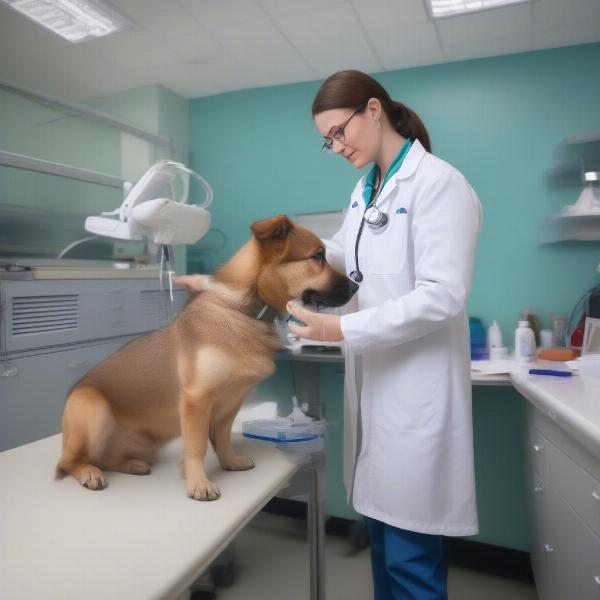Roundup, a common herbicide containing glyphosate, is a staple in many gardens and farms. However, if you’re a dog owner, you’re likely concerned about its potential impact on your furry friend. How long after spraying Roundup is it safe for dogs? This is a crucial question, and understanding the risks involved is vital for responsible pet ownership. This article will explore the potential dangers of Roundup exposure for dogs, recommended safety precautions, and answer the question of how long you should keep your dog away from treated areas.
Glyphosate, the active ingredient in Roundup, can pose risks to dogs if ingested or absorbed through the skin. While generally considered less toxic to mammals than insects, exposure can still lead to gastrointestinal upset, including vomiting and diarrhea. In more severe cases, it could cause respiratory issues, lethargy, and even liver or kidney damage. Puppies, smaller breeds, and dogs with compromised immune systems are particularly vulnerable.
Understanding the Risks of Roundup for Dogs
The toxicity of Roundup to dogs depends on several factors, including the concentration of the product used, the amount of exposure, and the individual dog’s health. Direct ingestion, such as licking treated grass or drinking contaminated water, poses the highest risk. Skin contact can also lead to absorption, especially if the dog’s skin is wet or has open wounds.
How Long to Keep Dogs Off Treated Areas
While there’s no single definitive answer, a general guideline is to wait until the sprayed area is completely dry, which usually takes between 24 to 72 hours. This allows the glyphosate to bind to the soil, reducing the risk of ingestion or absorption. However, for added safety, especially with puppies or sensitive dogs, consider waiting up to 7 days or even longer.
Factors Affecting Drying Time
Several factors influence drying time, including:
- Weather conditions: Sunny and windy conditions will dry the area faster than cloudy or humid weather.
- Type of Roundup: Different Roundup formulations have varying drying times. Always refer to the product label for specific instructions.
- Application method: If the Roundup was diluted with water, it will naturally take longer to dry.
Minimizing Roundup Exposure
Here are some practical tips to minimize your dog’s exposure to Roundup:
- Use pet-friendly alternatives: Consider using organic weed control methods like hand-pulling, vinegar solutions, or corn gluten meal.
- Clearly mark treated areas: Use flags or signs to indicate areas that have been sprayed with Roundup.
- Supervise your dog outdoors: Keep your dog on a leash in treated areas and prevent them from grazing or drinking from potentially contaminated water sources.
- Wash your dog’s paws: After walks in areas where Roundup might have been used, wipe your dog’s paws with a damp cloth.
What to Do If Your Dog Is Exposed to Roundup
If you suspect your dog has been exposed to Roundup, contact your veterinarian immediately. Symptoms to watch out for include vomiting, diarrhea, lethargy, loss of appetite, drooling, and difficulty breathing.
 Veterinarian Examining a Dog for Roundup Exposure
Veterinarian Examining a Dog for Roundup Exposure
Expert Insight: Dr. Emily Carter, DVM
“Early intervention is key when it comes to Roundup exposure. If you suspect your dog has been exposed, don’t wait for symptoms to appear. Contact your vet immediately.”
Expert Insight: Dr. David Miller, Veterinary Toxicologist
“While Roundup is generally considered less toxic to mammals, it’s always better to err on the side of caution, especially with vulnerable dogs. Prevention is always the best approach.”
Conclusion
Keeping your dog safe from Roundup requires careful planning and proactive measures. By understanding the risks, following safety guidelines, and opting for pet-friendly alternatives whenever possible, you can create a safe and healthy environment for your furry companion. Remember, a little precaution goes a long way in protecting your dog’s well-being.
FAQ
- How long does it take for Roundup to decompose in the soil? Roundup can take anywhere from a few days to several weeks to decompose, depending on factors like soil type, temperature, and moisture.
- Is Roundup harmful to other pets? Roundup can also pose a risk to cats and other animals. Similar precautions should be taken to keep them safe.
- Are there any long-term health effects of Roundup exposure in dogs? Some studies suggest a potential link between chronic glyphosate exposure and certain health issues in animals, but more research is needed.
- What are some pet-friendly weed killers? Vinegar solutions, corn gluten meal, and hand-pulling are effective and safe alternatives to chemical herbicides.
- Can I use Roundup around my vegetable garden? Exercise extreme caution when using Roundup near edible plants. Ensure a safe distance and follow product label instructions meticulously.
- What should I do if my dog ingests Roundup? Contact your veterinarian or an animal poison control center immediately.
- Are there any specific breeds more susceptible to Roundup toxicity? While any dog can be affected, puppies, smaller breeds, and those with pre-existing health conditions are generally more vulnerable.
ILM Dog is a leading international online resource dedicated to providing dog owners with expert advice and information on all aspects of dog care, from breed selection and training to nutrition, health, and grooming. Whether you’re a seasoned dog owner or just starting your journey, ILM Dog offers a wealth of reliable, practical information to help you provide the best possible care for your canine companion. From puppyhood to senior care, we cover every stage of your dog’s life. We also offer expert guidance on various dog-related products and accessories. For further assistance or to learn more about our comprehensive services, please contact us via email at [email protected] or call us at +44 20-3965-8624. ILM Dog – Your trusted partner in dog care.